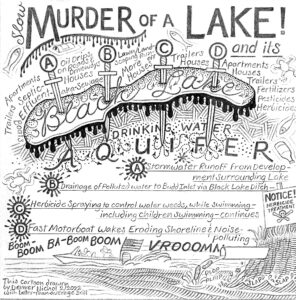Citizens for a Clean Black Lake (CCBL) will finally get a hearing March 8 on their petition to have Thurston County Commissioners dissolve the Black Lake Flood Control District which was formed improperly and has worsened lake-wide water quality problems.
The CCBL request was recently bolstered by a Federal court decision in December, 2021. The Court found that neither the Environmental Protection Agency nor the Washington Department of Ecology had updated standards necessary to protect water users from toxic chemicals.

The lawsuit identified many toxin standards that are nearly three decades old; the list includes toxics present in Black Lake. Mercury is known to have been present in Black Lake fish for years, as well as aluminum, 300,000+ gallons of which was emptied into Black Lake in March 2021 as an alum treatment for algae. Other toxins such as arsenic, ammonia and copper are likely present in Black Lake due to past industrial practices. (Read about the lawsuit at Northwest Environmental Advocates.)
The Court’s decision also confirms CCBL’s request last year to Ecology to deny the permit used by the Flood Control District—a permit based on decades old data. The Department of Ecology has also acknowledged that “no coherent state program exists designed to address non-point pollution statewide and to protect threatened and endangered species as well as public health.” This applies directly to the non-point pollution threatening the Black Lake ecosystem and the connected waters of Puget Sound and Gray’s Harbor.
To further erode public trust in the data used to issue permits, recent articles in The Intercept by Sharon Lerner detail the pressures put on the EPA by industry to ignore or falsify data about the toxicity of chemicals to gain approval for use. (See The Department of Yes: How Pesticide Companies Corrupted the EPA and Poisoned America and Whistleblowers Expose Corruption in EPA Chemical Safety Office.)
For these reasons, CCBL asserts it cannot rely on the EPA or Department of Ecology’s risk assessment for these toxic chemicals. The Black Lake Flood Control District leaders have sprayed chemicals annually on Black Lake since 2013—contrary to the District’s own Aquatic Vegetation Management plan which approved only two years of herbicide use.
Applying these poisons to Black Lake with no environmental assessment is particularly troubling because Black Lake overlies the city wells of Olympia and Tumwater and 16 Critical Area Recharge Areas. The lake also forms a large exposed portion of the Strategic Groundwater Reservation for the State Capitol, the sole source aquifer for our area—the water we drink and bathe in.
Black Lake is a vital drinking water aquifer that requires oversight and management by the County, the Department of Ecology, the cities of Olympia and Tumwater and concerned residents. This duty can’t be off-loaded to a three-member Board of lakefront property owners whose stated mission is to rid the lake of weeds that damage watercraft engines.
To learn more or participate:
Read the Sept 2021 article and visit Citizens for a Clean Black Lake Facebook page.
Attend the Zoom public hearing on March 8 at 3 pm by registering at: Thurston County Public Hearings or submit written testimony to the County Commissioners beforehand.
Esther Kronenberg is Co-Chair of Citizens for a Clean Black Lake. She is inspired by the work, memory and vision of her Co-Chair, Suzanne Kline, who recently passed away.
I have lived on black lake for 12 years..
I have a degree in Environmental biology with experience in water quality and ecosystem management.
I created and implemented a water and sediment quality study in the Willapa estuary from 2001-2004. The study found similar toxins and issues that are occuring in black lake.
If I can be of any assistance please contact me.
Respectfully,
Michael McNamara.